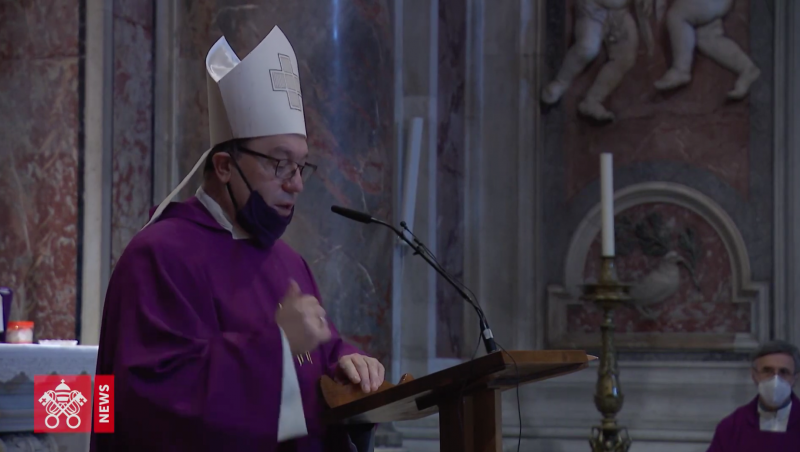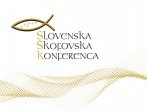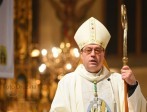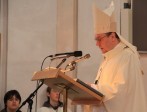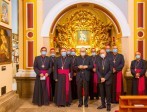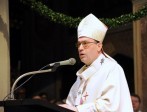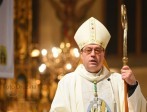Fellow priests, Ministers, Ambassadors, co-workers, brothers and sisters,
Today we are here as representatives of bishops, priests, believers from all over Slovenia because we know how many of us gathered here 24 years ago. Some of us are living witnesses of that moment - when the Christmas tree from Slovenia first adorned the St. Peter's Square.
I am glad that we are celebrating this holy sacrifice here at the altar, beneath which rests the body of Pope John Paul II, whose 100th birthday we celebrated this year. The Holy Pope John Paul II had a close relationship with the life of the Church in Slovenia, as he visited our homeland twice as pope. He also watched our efforts for our independence of the Republic of Slovenia closely. When we declared independence, he was the first to recognize it. That is why we are here today. We are here to pay attention and thank him for those efforts of his efforts, but we are here to ask him as a saint, as our intercessor with God, to accompany us in our efforts, to accompany us in our crises and falls, to be able to preserve the gift of independence and to grow in openness and respect, and to be able to stand together when it is most needed.
At this Holy Mass, we also wish to remember the late Archbishop Dr Alojzij Šuštar, who with his moral and religious life and his countless connections was one of the key personalities at the time of the independence of our homeland.
Here in Rome, however, we had a man who also had countless connections, not only here in the Vatican, but also around the world. He was our first ambassador to the Holy See. Not only that, we had a man here who carried Slovenia in his heart and was ready to do everything he could for it, everything in his power. That was Dr Štefan Falež, whose centenary we celebrated a few days ago. I visited him three days before his death when he said: "Continue my efforts for my dear Slovenia." We owe him not only gratitude but also that his efforts would not be forgotten and that they would bear rich fruit.
The Church Fathers say that the daily word of God is the one that God sends us on the path that particular day. Therefore, today we have taken the word of God from Friday of the second week of Advent. A reading from the book of the prophet Isaiah tells us that God and man are eternal interlocutors. This is especially true for the chosen nation. Today's passage is a questioning of conscience about this interlocution. God, the Holy One of Israel, revealed Himself to the fathers long ago. He later sent prophets to the people and guided and taught them through them. If people accepted the words of the prophets, if they listened to the God-given Words and fulfilled them, they would walk in the right path. Their peace would be like a river, and justice would abound. If people could have an insight into God's plan, then Jerusalem would certainly not be destroyed, its inhabitants would not end up in slavery, and the land would not be devastated. However, both God and men create history. We also know that history cannot be reversed. We cannot change what has happened. Nevertheless, we have one option; we can learn from past events and use the wisdom here and today.
We need to let it all touch us, let it all touch our hearts. In the depths of our hearts, we are all repeatedly called to conversion, to abandon what enslaves us, to abandon what makes us dead, and to embark on the path of a new man, in renewed fidelity to God who is good and merciful and, as says the Apostle Peter in his 2nd letter (2 Peter 3: 9):"God is patient, because he wants everyone to turn from sin and no one to be lost." The possibility of conversion is not our decision, but his gift offered to us.
Today's gospel tells us how God wanted to draw this generation to Himself in various ways, but He did not find the open door of their hearts. This was already experienced by John the Baptist, who seemed too strict and too demanding. However, when the long-awaited Messiah came, they found an excuse in him not being rigorous enough and not demanding enough to associate with sinners, prostitutes, etc. Man will always find innumerable reasons to justify the state of his sin and his unwillingness to repent. Here is an example of Pope John Paul II. Here is his grave. We know that he visited believers on all continents. Why did he visit them? To strengthen them in the faith and encourage them to live by the faith. However, we know how many grumbled that he was wasting money and looking for his popularity. If he were just at home and not travelling anywhere, he would be accused again of shutting himself in and not seeing the people around him.
Christianity gave birth to many saints who lived and radiated holiness in various ways. Furthermore, these saints are bright signs in our sky. Thank God, there are many of these signs. Still, many people even today obscure their view. They are not ready to accept these obvious signs, to look inside themselves and accept the truth that God is looking for many ways to find a man, addressing us because he wants to draw us to himself.
Conversion, therefore, means putting God at the centre and not having yourself and your images of God at the centre. How many problems in our lives would fall away if we looked at things around us in a different light, if we looked at these things and events with God's eyes.
In a letter to the Philippians, St. Paul invites us to shape our thinking in the image of Jesus Christ. He instructs us as follows: "think the same way that Christ Jesus thought" (cf. Phil 2: 5). The remaining Advent time before Christmas is an opportunity to accept the gift of conversion, which means to put on the "glasses of Christ" and look at the world, events and people around us through them.
The Holy Pope John Paul II, Archbishop Alojzij Šuštar and Dr Štefan Falež, are venerable centenarians whom we watch and admire in spirit today. They were people of humble and strong faith, and they allowed God to approach them even in ways they could not have imagined at first. God surprises us repeatedly. God always wants to take us to where it is best for us and where we can do the most for others and ourselves.
Thus, we see how God surprises us repeatedly when He comes to us with the gift of salvation. If we accept it and let it enter our hearts, if we allow it to enter our lives, then we too can bring new life and hope to others.
And what do people need today? Hope. Most of all, they expect us to encourage them in the hope that good will win in the end and that they are not alone. Venerable centenarians of ours, whom we remember today, are precisely people of great hope. How many trials all three survived on their way. I will never forget Dr Štefan Falež's words that he came here with a suitcase and a rosary in his hand. It was all he had, and that accompanied him every step of the way. He held his rosary in his hands every day even as he was saying goodbye to this world and stepped into the fullness of life with God.
Let us pray here today when we represent Slovenia. How many would like to be here today? It is interesting, when I put this spruce on Facebook. 17, 000 of people immediately responded. They wrote that we are their representatives. So we are here in the name of those who would like to be here, but cannot be, but are with us in spirit and prayer. Let us unite these prayers together and create a great communion of God's children, children who give and hope that at the end, the good will win. We know that it will win because Christ, by his resurrection, has already opened the way to a life that has no decline. Amen.
Msgr Alojzij Cvikl

